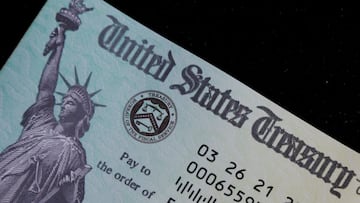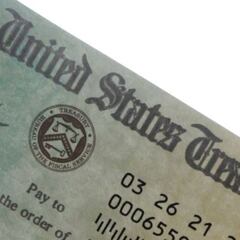Third stimulus check: how many Americans have received payment and how many are waiting?
The American Rescue Plan allocated around $400 billion for a third check, of which around 96% have been sent.


The American Rescue Plan passed by Congress and signed into law in March allocated around $400 billion for a third stimulus check. The IRS began sending these direct payments worth $1,400 for heads of household and for each of their dependents in March.
As of 28 April, the US tax authority has sent approximately 96%, or $384 billion worth of payments through direct deposit, paper checks, and pre-paid visa debit cards. The IRS has sent six batches of payments which have varied in size and scope as time has gone on. Over half of the payments were sent in the first batch which included more than 90 million checks. The most recent batch included just over 2 million payments valued at around $3.4 billion.
How many checks were sent in each batch?
According to the IRS which issues a press release each week detailing the number of checks the agency sent, the numbers are as follows:
• First Batch: ~90 million checks, $242 billion.
• Second Batch: ~37 million checks, $83 billion.
• Third Batch: ~3 million checks, $10 billion.
• Fourth Batch: ~25 million checks, $36 billion.
• Fifth Batch: ~2 million checks, $3.4 billion.
• Sixth Batch: ~2 million checks, $3.4 billion.
Who has yet to receive their payment?
The IRS sent payments to almost everyone they have tax information for. Now, the agency is encouraging all those eligible, even those who do not normally file a tax return, to do so in order to receive their payments. Under the American Rescue Plan, there are a few benefits that millions of families and individuals in the US could qualify for, but in order to distribute the payment, the IRS has to verify eligibility and know where to send the payment. These programs include,
• Third Direct Payment, including "Plus-up Payments"
The outstanding payments mostly relate to individuals or families who have yet to file a 2020 tax return. This group could also include individuals experiencing homelessness. The IRS has also stated that those “who didn't get a first or second round Economic Impact Payment or got less than the full amounts may be eligible for the 2020 Recovery Rebate Credit, but they'll need to file a 2020 tax return.”
Low- or no-cost accounts let people with no permanent address file taxes and claim a direct deposit of their Economic Impact Payments. #IRS encourages those serving people experiencing homelessness to learn more from @FDICgov: https://t.co/zj7biI3rSa #COVIDreliefIRS pic.twitter.com/V5zfhYzKbz
— IRSnews (@IRSnews) May 3, 2021
Are there any tools to help me file my taxes?
Yes. The IRS provides free tax preparation to some who qualify:
• People who generally make $57,000 or less
• Persons with disabilities; and
Related stories
• Limited English-speaking taxpayers .
Once a tax return has been filed, the IRS can get to work to determine the amount of money a family or individual would be entitled to. Those in the US have until May 17th to file their taxes. For those looking for an extension, options are available.
You can claim your tax refund without spending any money. #IRSFreeFile offers people who made $72K or less in 2020 tax software to do their #IRS tax returns from a home computer or mobile device. Check https://t.co/3byJqk9fiF pic.twitter.com/xskgPdLz6J
— IRSnews (@IRSnews) May 4, 2021

